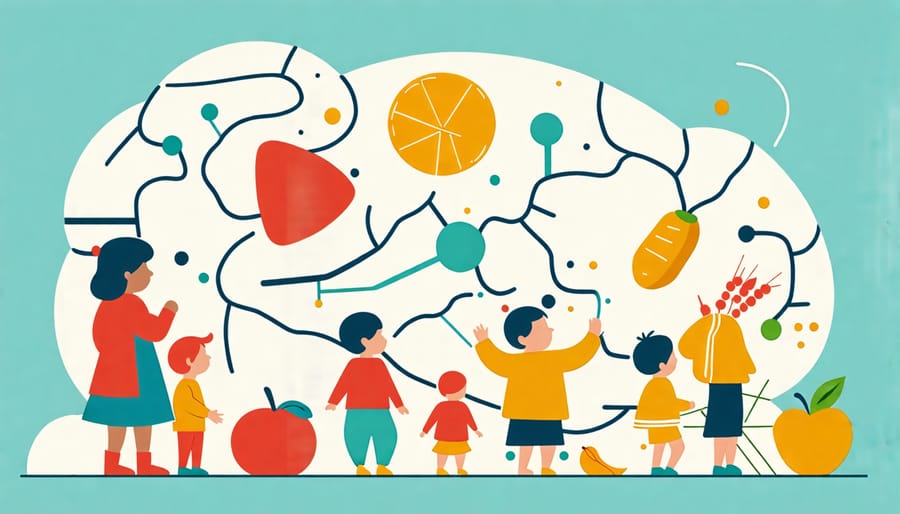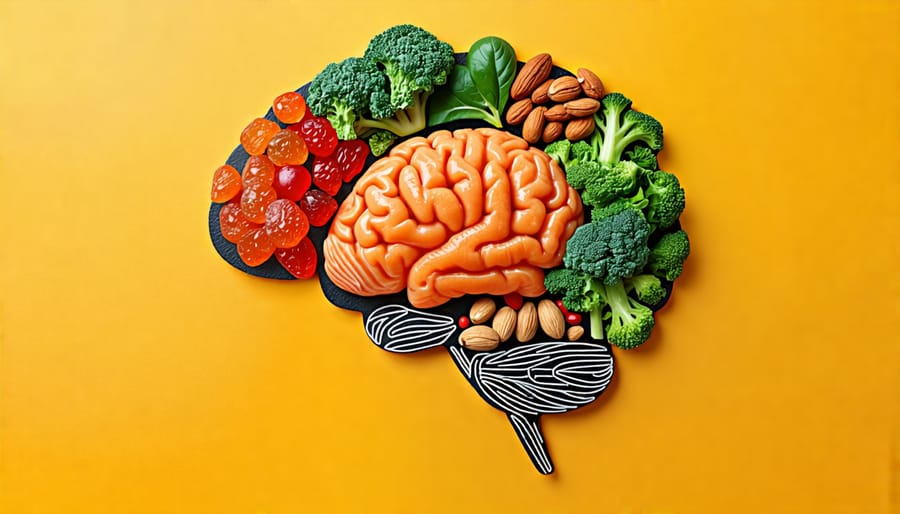Examine your child’s diet for hidden sugars and artificial additives that could aggravate neurodevelopmental disorders. Review snack options and consider swapping traditional candies for healthier alternatives. Freeze dried candy canada free shipping offers a different choice that can even reduce some complicating factors. Consult with a dietitian to craft a customized nutrition plan mindful of your child’s specific needs. Prioritize whole foods rich in essential nutrients like omega-3s and B vitamins, known to boost brain health and cognitive function.
Understanding the Role of Nutrition in Neurodevelopment
Key Nutrients for Brain Development
Understanding the role of key nutrients in brain development can empower parents and educators to support children with neurodevelopmental disorders effectively. Essential nutrients such as omega-3 fatty acids, iron, zinc, and vitamins like B6, B12, and D play a crucial role in the healthy growth of the brain. Omega-3 fatty acids, found in fish like salmon and flaxseeds, promote brain cell communication and enhance learning and memory capabilities. Iron, abundant in lean meats, beans, and fortified cereals, supports oxygen transport to the brain, crucial for cognitive function and attention. Zinc aids in neuron function and synaptic plasticity, with sources including nuts, seeds, and whole grains. Vitamin B6 and B12 are vital for neurotransmitter synthesis, influencing mood and behavior; they’re found in poultry, fish, eggs, and dairy products. Vitamin D, besides its well-known role in bone health, is essential for brain development and can be sourced from sunlight exposure and fortified foods. Ensuring that these nutrients are incorporated into a child’s diet can be part of a comprehensive approach to managing and understanding neurodevelopmental disorders. Delving deeper into dietary impacts may reveal the link in autism spectrum disorders, illuminating further personalized nutrition strategies.

Nutritional Deficiencies and Their Effects
Neurodevelopmental disorders such as ADHD, autism spectrum disorder, and others can be significantly impacted by nutritional deficiencies. Critical nutrients like omega-3 fatty acids, iron, zinc, and B vitamins play a vital role in brain development and function. A lack of omega-3 fatty acids, found in fish oils, can affect communication between neurons, which is crucial for cognitive processes and behavior regulation. Iron is essential for the production of neurotransmitters, and a deficiency may result in impaired attention and learning challenges. Zinc supports memory formation and neural signaling, making it indispensable for children with neurodevelopmental disorders. A deficiency in zinc can lead to behavioral issues and difficulties with sensory perception. Similarly, B vitamins, including B6, B9, and B12, are crucial for several brain processes, including the synthesis of neurotransmitters. Deficiencies in these vitamins could contribute to mood swings, cognitive disturbances, and developmental delays. The interplay between these nutrients highlights the importance of a balanced diet, tailored to individual needs, emphasizing a multidisciplinary approach. A customized nutritional plan, developed in consultation with healthcare professionals, can greatly support the overall management of neurodevelopmental disorders and enhance a child’s quality of life. Addressing these deficiencies with empathy and understanding can build a supportive environment for both children and their caregivers.
Introduction to Freeze Dried Candy

Examining the Nutritional Content of Freeze Dried Candy
High Sugar Content and Its Implications
High sugar intake, particularly from enticing sources like freeze-dried candy, can pose several health challenges for children, especially those with neurodevelopmental disorders. Excessive sugar consumption often leads to spikes and crashes in blood sugar levels, which can exacerbate symptoms such as irritability, hyperactivity, and concentration difficulties. These symptoms can be particularly challenging for children with disorders like ADHD or autism. Additionally, a diet high in sugar can contribute to inflammation, which is increasingly being linked to neurodevelopmental issues. Finding a balance in diet is crucial, so parents and caregivers should focus on reducing sugar intake while providing nutrient-rich foods that support brain health. By being mindful of the sugar content in treats and opting for healthier alternatives, a supportive environment can be created for children to thrive. Understanding these dietary impacts is a step towards customized care that addresses each child’s unique needs.
Additives and Preservatives in Candy
Freeze-dried candy, a popular treat among kids, often contains various additives and preservatives that may influence neurodevelopment, especially in children with existing neurodevelopmental disorders. Common additives include artificial colors and flavors, which are used to enhance the candy’s appearance and taste but have been associated with behavioral changes in some children. For instance, certain artificial colorings, like tartrazine and sunset yellow, can exacerbate symptoms in those with attention-deficit hyperactivity disorder (ADHD). Preservatives such as butylated hydroxyanisole (BHA) and butylated hydroxytoluene (BHT) are used to prolong shelf life but may negatively impact brain health by interfering with neurotransmitter balance. The consumption of these substances in large amounts could potentially heighten the risk of exacerbating symptoms of disorders such as autism spectrum disorder (ASD) and ADHD. As parents and educators, being informed about the potential effects of these additives can aid in making dietary choices that support optimal neurodevelopment. While occasional treats are generally harmless, a balanced approach can foster better neurological health in children, particularly those with neurodevelopmental concerns.
Parents’ Role in Managing Nutrition for Child Development
Crafting a Balanced Diet
Creating a balanced diet for children with neurodevelopmental disorders can significantly aid their growth and overall wellness. Start by incorporating a variety of fresh fruits and vegetables, which provide essential vitamins and antioxidants that support brain health. Whole grains like oats and brown rice are excellent for maintaining steady energy levels throughout the day. Protein is vital, too, aiding in the production of neurotransmitters; sources such as lean meats, beans, and nuts are great options. Don’t forget healthy fats like those found in avocados and fish, as they are crucial for brain development. It’s important to customize the diet to suit individual needs, perhaps with guidance from healthcare professionals or nutritionists. Avoid processed foods and instead focus on whole, nutrient-dense foods that nourish the body and mind. By creating nutritious and appealing meals, you can help foster a positive relationship with food, which is essential for long-term health and development.

Monitoring and Moderating Snack Consumption
Monitoring and moderating snack consumption, especially of options like freeze dried candy, is crucial for children, particularly those with neurodevelopmental disorders. It’s important for parents to first understand the potential impacts of these snacks on their child’s development. While freeze dried candy might seem appealing due to its flavor and texture, it’s often high in sugar, which can lead to fluctuating glucose levels. These fluctuations may adversely affect behavior and concentration in children who are sensitive due to their neurodevelopmental condition. To manage consumption effectively, parents can introduce structured snack times, allowing only a moderate amount of sweets. Pairing candy with nutrient-rich foods can help stabilize blood sugar levels, reducing potential negative impacts. Engaging children in understanding healthy eating can be empowering. Simple conversations about nutrition can set the foundation for lifelong healthy habits. Additionally, parents should familiarize themselves with potential risks associated with other products like THC gummies, and their impact on neurodevelopment, by referring to reliable resources such as this THC gummies and neurodevelopment guide. Balancing indulgence with nutrition allows for both enjoyment and better neurodevelopmental outcomes.
Customized Treatment Approaches Through Multidisciplinary Collaboration
When addressing the complex needs of children with neurodevelopmental disorders, a multidisciplinary approach is crucial for creating effective, customized treatment and nutrition plans. By bringing together experts from various fields, including pediatricians, neurologists, psychologists, nutritionists, and therapists, healthcare providers can develop a comprehensive understanding of each child’s unique challenges and strengths. This collaborative approach ensures that all aspects of a child’s development are considered when designing interventions. Multidisciplinary teams work closely with parents and caregivers to gather valuable insights into a child’s daily life, preferences, and routines. This information helps tailor treatment plans to the individual, increasing the likelihood of success and adherence. By fostering open communication and collaboration among team members, child mental health systems can be optimized to deliver coordinated, evidence-based care that addresses the specific needs of each child and family. Moreover, a multidisciplinary approach recognizes the importance of nurturing positive parent-child relationships in supporting a child’s development. Professionals can provide guidance on how interactive behaviours impact a child’s progress and offer strategies for enhancing these interactions. By empowering parents with the knowledge and skills to support their child’s growth, healthcare teams can create a supportive environment that promotes optimal outcomes for children with neurodevelopmental disorders.
Conclusion
In conclusion, nutrition plays a crucial role in supporting healthy neurodevelopment in children, especially those with neurodevelopmental disorders. While freeze dried candy may seem like a convenient and enjoyable treat, it is important for parents to consider its potential impact on their child’s overall health and well-being. By understanding the nutritional content of these products and their possible effects on behavior, attention, and cognitive function, parents can make informed decisions about their child’s diet. It is essential to remember that every child is unique, and their nutritional needs may vary based on their specific disorder, symptoms, and treatment plan. Consulting with a healthcare professional or registered dietitian can help parents develop a customized dietary approach that supports their child’s neurodevelopmental health while still allowing for occasional treats in moderation. By staying informed, working closely with healthcare providers, and prioritizing a balanced and nutrient-rich diet, parents can help their children with neurodevelopmental disorders thrive and reach their full potential. Remember, small changes in daily habits can lead to significant improvements in a child’s overall health and well-being, empowering them to navigate the challenges of their disorder with greater ease and resilience.




